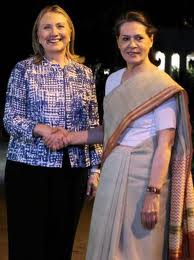 New Delhi, May 8: Prime Minister Manmohan Singh on Monday told U.S. Secretary of State Hillary Clinton that India was aligned with the international community on checking the spread of nuclear weapons but would be guided by its national interests on securing its energy supplies.
New Delhi, May 8: Prime Minister Manmohan Singh on Monday told U.S. Secretary of State Hillary Clinton that India was aligned with the international community on checking the spread of nuclear weapons but would be guided by its national interests on securing its energy supplies.India's stand on non-proliferation and approach to importing oil was reiterated during an 80-minute unstructured meeting between Ms. Clinton and Dr. Singh that was described by informed sources as “cordial'' during which “a lot of issues were discussed.''
The meeting preceded an address by Ms. Clinton in Kolkata where she dwelt on specific U.S. expectations from India in dealing with the Iranian nuclear issue. “The reason why India, China and Japan and European countries are being asked to lower their supplies is to keep the pressure on Iran,” she said while commending Japan for doing so despite last year's tsunami and a shutdown of its nuclear programme.
But during her interaction with Dr. Singh, Ms. Clinton dwelt on the “broader regional and global implications'' if the U.S. pressure through sanctions on Iran did not force it to completely open up its nuclear programme for inspections. The Indian delegation was in a listening mode while Ms. Clinton spoke of attempts by the P5 + 1 grouping to engage with Iran and apprehensions among the neighbours about its recalcitrant behaviour.
The meeting did not see Ms. Clinton seeking a further reduction in Indian purchase of Iranian oil and this task is likely to be entrusted to U.S. Special Envoy for global energy issues Carlos Pasqat, who will visit Delhi later this month during a swing through the region to convince countries such as India that import a substantial quantity of oil from Iran.
The two leaders also discussed how both nations could contribute to sustaining Afghanistan after the 2014 withdrawal of western forces.
Ms. Clinton also told the Prime Minister about last week's U.S.-China strategic dialogue.
Under the bilateral rubric, India mentioned the seven indigenously designed nuclear plants it was putting up and reiterated its commitment to providing civil nuclear business to U.S. companies.
In Kolkata, Ms. Clinton expressed her reservations about the limited nuclear liability legislation: “We have made it clear that under the legislation that was passed it will be difficult for U.S. companies to participate because we have private companies that are in the market place whereas other nuclear companies are backed up by their governments.''
But according to officials privy to the meeting and who will be at delegation-level talks on Tuesday, Westinghouse is moving ahead with the project to set up six reactors in Gujarat and a team had visited the site. They intend going full steam ahead once legislation and rules relating to the liability on suppliers in case of an accident go through the no-objection process in Parliament.





Comments
Add new comment